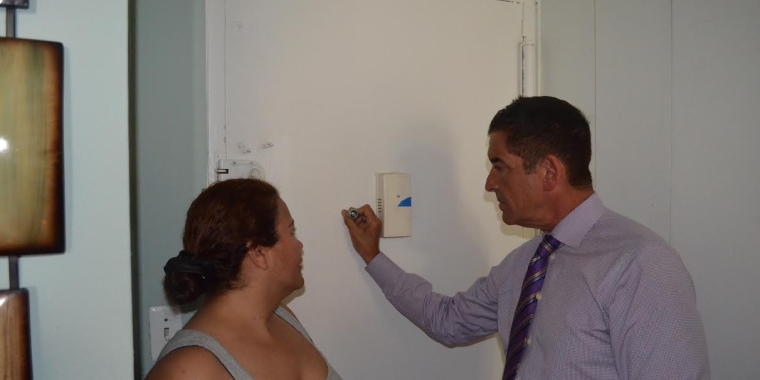
Mayor Bloomberg, State Senator Klein And Health Commissioner Frieden Announce New Restaurant Inspection Program To Improve Food Safety
Jeffrey D. Klein
February 1, 2009

Public Posting of Sanitary Grades Gives Customers More Information Up Front
Mayor Michael R. Bloomberg and Deputy Senate Majority Leader Jeff Klein today announced that New York City is updating its restaurant inspection system to improve sanitary conditions and give consumers more information. Under the new model, the Health Department will increase inspections for less sanitary restaurants and require all establishments to conspicuously post letter grades – a measure championed by Senator Klein to keep the public better informed about inspection results. The new system will be phased in over the next two years. This approach will concentrate city resources on the restaurants that pose the greatest risk to public health and place no additional burden on establishments that maintain sanitary conditions. Dr. Thomas R. Frieden, New York City Health Commissioner, and State Assemblyman Steve Cymbrowitz joined Mayor Bloomberg and Senator Klein at the New York Marriott at the Brooklyn Bridge for today's announcement.
"We know New York City's restaurants are the best in the world and we want them to also be the cleanest," said Mayor Bloomberg. "This new system will encourage the less sanitary restaurants to clean up – and won't punish the good guys. As sanitation improves, so will business. The more residents and tourists can trust the food they buy in New York City restaurants, the more likely they are to patronize them."
"Today's announcement is a great step forward toward improving the overall public health of all New York City residents," said Senator Jeff Klein (D-Bronx/Westchester). "As someone who has spent years advocating for a more consumer friendly system, I am thrilled that New York City diners will finally have easy access to the latest inspection results of their favorite restaurants. Having a letter grade posted for all diners to see will provide a real incentive for restaurants with a 'C' hanging in the doorway to clean up their act."
Senator Klein will again introduce legislation in the 2009 Legislative Session to require local departments of health state-wide to implement a letter grading system. "Whether New Yorkers are dining out for a routine meal or to celebrate a special occasion, their only reservations should be to book a table. I applaud the Mayor and the Health Department's outstanding efforts to improve the well being of all New Yorkers," said Senator Klein.
Food-related illness is a source of growing public concern in New York City. Complaints about food-borne illness have increased in recent years, and rodent infestations are a common problem in restaurants. The Health Department reports signs of rodents in 25 percent of the establishments inspected. Food poisoning causes missed work and school, emergency room visits, hospitalizations, and even deaths. In fact, based on national estimates, more than 11,000 New Yorkers are treated in emergency departments each year for restaurant-related food related illnesses, and thousands of people are hospitalized as a result. The cost of these hospitalizations and emergency room visits is more than $130 million annually.
"By requiring restaurants to publicly post grades, the new food safety initiative will help consumers make more informed choices about where to eat, while increasing restaurant operators' motivation to stay clean," said Dr. Frieden. "New York City will have safer restaurants and fewer cases of food poisoning."
Senator Klein has been releasing regular reports, Enough to Make you Sick, on the sanitary conditions of supermarkets and New York City restaurants since 2000. Senator Klein's 2008 report studied a subset of New York City's 20,000 restaurants with the 100 worst inspection reports, with violation point scores ranging from 69 to 600 – far exceeding the 28 points that prompt re-inspection. Of the bottom 100 restaurants, 87 percent had at least one category of pest cited in their most recent inspection.
Research from other jurisdictions suggests that public posting of inspection findings has the following outcomes:
Business improves at restaurants with higher grades. When sanitation grades are conspicuously posted at food service establishments, customers use the information to seek out establishments with higher grades. Among Los Angeles restaurants, improvements in grades are associated with increased sales.
Restaurants improve their sanitary standards. When Los Angeles County started posting grades in 1987, only 40 percent of its food service establishments received "A" grades. By 2006, 83percent were meeting that standard.
Fewer people get sick. Although the association is not proven, Los Angeles has recorded a 20 percent decline in hospitalizations for food-borne illnesses since it started posting sanitary grades in food service establishments.
The new model will also bring New York City closer to the FDA recommended schedule of at least three full inspections every year for full service restaurants. At present, most New York City restaurants receive only one.
Share this Article or Press Release
Newsroom
Go to Newsroom


